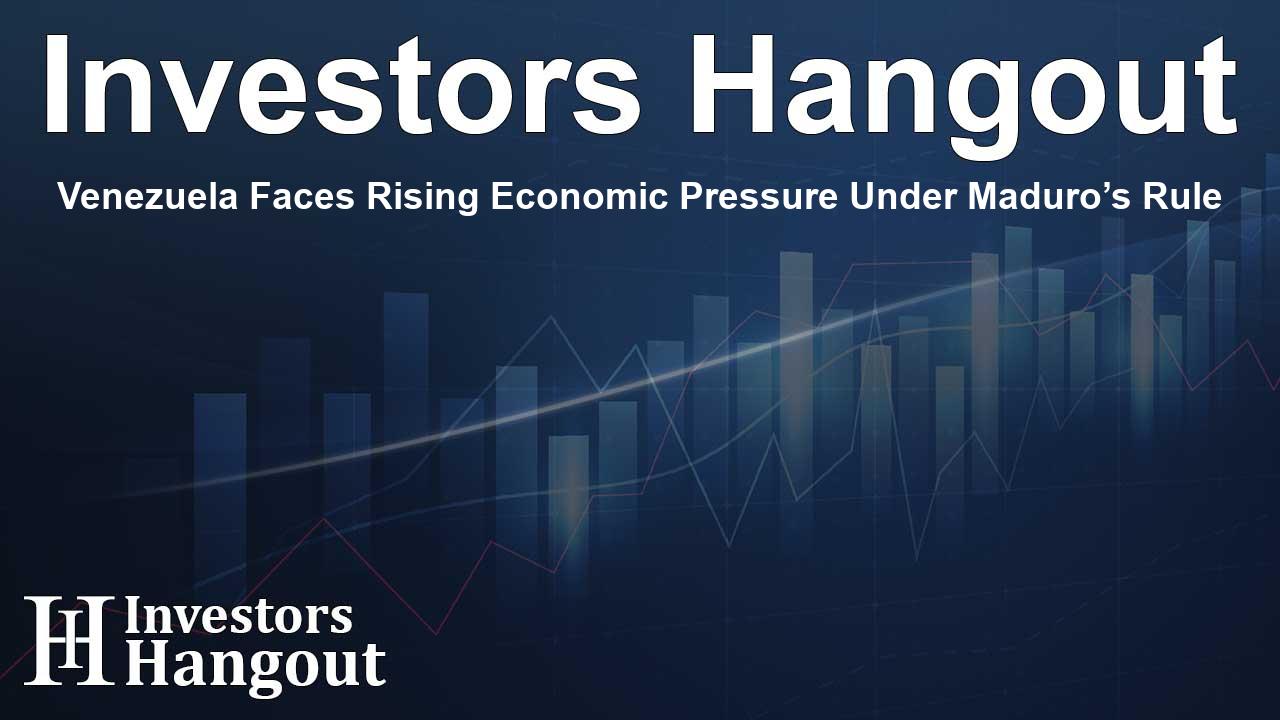Venezuela Faces Rising Economic Pressure Under Maduro’s Rule

Venezuela Faces Economic Challenges Under Maduro
In the wake of significant political tensions, Venezuela finds itself grappling with a deepening economic crisis. After claiming victory in a controversial election, Nicolás Maduro is dealing not just with domestic unrest but also with stark economic realities that are difficult to ignore.
Currency Instability and Inflation Woes
The Venezuelan bolivar is currently experiencing a significant depreciation in unofficial markets, trading at up to 20% weaker than the official rate. This is the largest gap since 2022, indicating a dwindling dollar supply that the government has relied on to stabilize the economy. It appears Maduro exhausted a considerable part of the dollar reserves during his pre-election campaign, aiming to attract voters with lavish spending that ultimately failed to yield legitimate support.
The Risk of Rapid Inflation
As the currency continues to weaken, there's a real risk that Venezuela could descend back into the hyperinflation that has plagued the nation for years. Over the past decade, Venezuela has experienced an astounding 80% drop in economic output, and while there have been efforts to stabilize the economy recently, rising inflation could undo this progress.
Economic Experts Weigh In
Experts, including economist José Manuel Puente, argue that the government should allow the bolivar to weaken. Keeping the exchange rate artificially high for electoral purposes has created a dangerous imbalance. Puente warns that such policies typically lead to an eventual adjustment that results in an inflationary shock, coupled with an economic slowdown.
Government Response to Economic Pressures
In response to these financial strains, the government has taken steps such as reducing reserve requirements for banks to encourage lending. However, the challenges in the currency market remain acute, with demand for dollars outstripping what is provided by the central bank. In practice, this has pushed many into using a parallel market, where it now costs 43.5 bolivars to buy a single dollar.
Accessing the Official Rate
Obtaining dollars at the official exchange rate has become increasingly difficult due to the central bank's limited offerings, which fell to just $300 million last month—about a third of the amount sold in July. Such limitations exacerbate issues of accessibility for the average citizen, as the true cost of living continues to climb.
The Impact of Government Spending
Maduro’s pre-election spending spree included widespread advertisement campaigns and frequent rallies. This prompted the central bank to increase dollar sales to absorb excess currency within the economy. However, given that inflation continues to rise, the bolivar remains overvalued, contributing to a challenging business environment.
Struggles of Venezuelan Businesses
Venezuelan businesses are now advocating for a weaker bolivar to enhance their competitiveness against imports. Leaders of major business associations like Fedecámaras have emphasized that a little relief could help industries recover. Amidst all this tumult, approximately 82% of the Venezuelan population lives in poverty, with many struggling to meet their daily needs.
Political Unrest Amplifying Economic Situation
As protests and dissent grow, Maduro challenges calls for election audits from both the opposition and foreign governments. The political landscape is tumultuous, with opposition figures facing arrest or forced exile. With claims of electoral success, Maduro's narrative stands in stark contrast to the realities faced by many citizens, who see alternative candidates as more viable options.
The Future of Venezuela
The future remains uncertain as economic pressures threaten to drive even more citizens to leave the country, adding to the already staggering number of approximately 8 million Venezuelans who have fled since 2015. The crisis continues to unfold, with many remaining hopeful for a turnaround but conscious of the adverse conditions surrounding their daily lives.
Frequently Asked Questions
What led to the current economic crisis in Venezuela?
The crisis stems from political instability, mismanagement of resources, and a significant drop in oil revenues, which were the backbone of the country's economy.
How has the bolivar’s value changed recently?
The bolivar has weakened significantly, trading 20% lower than the official rate, reflecting a shortage of dollars and growing inflation.
What measures is Maduro's government taking to address the economic issues?
Recently, the government adjusted reserve requirements for banks to stimulate lending, but much more is needed to address the fundamental economic challenges.
Why is there a growing need for businesses to have a weaker bolivar?
A weaker bolivar is seen as vital for businesses to remain competitive against imports, helping to alleviate the high costs of living.
What are the likely outcomes of the current political situation?
The combination of economic instability and political unrest could lead to increased migration and further international isolation unless significant changes occur.
About Investors Hangout
Investors Hangout is a leading online stock forum for financial discussion and learning, offering a wide range of free tools and resources. It draws in traders of all levels, who exchange market knowledge, investigate trading tactics, and keep an eye on industry developments in real time. Featuring financial articles, stock message boards, quotes, charts, company profiles, and live news updates. Through cooperative learning and a wealth of informational resources, it helps users from novices creating their first portfolios to experts honing their techniques. Join Investors Hangout today: https://investorshangout.com/
Disclaimer: The content of this article is solely for general informational purposes only; it does not represent legal, financial, or investment advice. Investors Hangout does not offer financial advice; the author is not a licensed financial advisor. Consult a qualified advisor before making any financial or investment decisions based on this article. The author's interpretation of publicly available data shapes the opinions presented here; as a result, they should not be taken as advice to purchase, sell, or hold any securities mentioned or any other investments. The author does not guarantee the accuracy, completeness, or timeliness of any material, providing it "as is." Information and market conditions may change; past performance is not indicative of future outcomes. If any of the material offered here is inaccurate, please contact us for corrections.